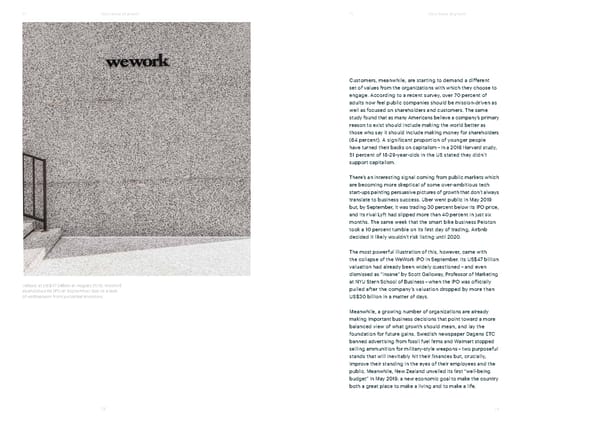T1 Many faces of growth T1 Many faces of growth Customers, meanwhile, are starting to demand a different set of values from the organizations with which they choose to engage. According to a recent survey, over 70 percent of adults now feel public companies should be mission-driven as well as focused on shareholders and customers. The same study found that as many Americans believe a company’s primary reason to exist should include making the world better as those who say it should include making money for shareholders (64 percent). A significant proportion of younger people have turned their backs on capitalism – in a 2016 Harvard study, 51 percent of 18-29-year-olds in the US stated they didn’t support capitalism. There’s an interesting signal coming from public markets which are becoming more skeptical of some over-ambitious tech start-ups painting persuasive pictures of growth that don’t always translate to business success. Uber went public in May 2019 but, by September, it was trading 30 percent below its IPO price, and its rival Lyft had slipped more than 40 percent in just six months. The same week that the smart bike business Peloton took a 10 percent tumble on its first day of trading, Airbnb decided it likely wouldn’t risk listing until 2020. The most powerful illustration of this, however, came with the collapse of the WeWork IPO in September. Its US$47 billion valuation had already been widely questioned – and even dismissed as “insane” by Scott Galloway, Professor of Marketing Valued at US$47 billion in August 2019, WeWork at NYU Stern School of Business – when the IPO was officially abandoned its IPO in September due to a lack pulled after the company’s valuation dropped by more than of enthusiasm from potential investors. US$30 billion in a matter of days. Meanwhile, a growing number of organizations are already making important business decisions that point toward a more balanced view of what growth should mean, and lay the foundation for future gains. Swedish newspaper Dagens ETC banned advertising from fossil fuel firms and Walmart stopped selling ammunition for military-style weapons – two purposeful stands that will inevitably hit their finances but, crucially, improve their standing in the eyes of their employees and the public. Meanwhile, New Zealand unveiled its first “well-being budget” in May 2019: a new economic goal to make the country both a great place to make a living and to make a life. 13 14
 Accenture-Fjord-Trends-2020-Report Page 6 Page 8
Accenture-Fjord-Trends-2020-Report Page 6 Page 8